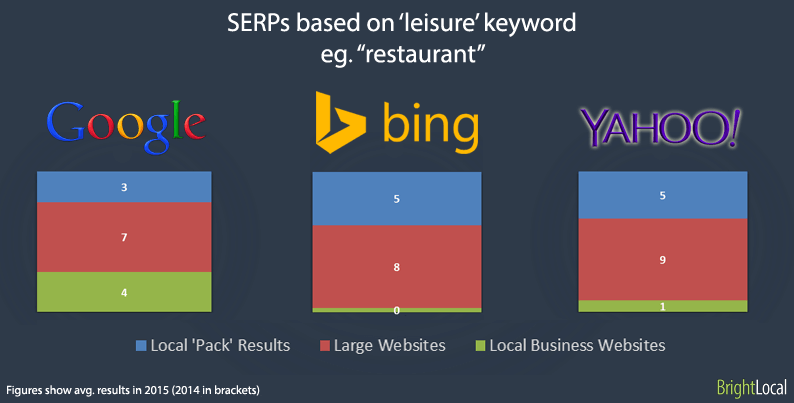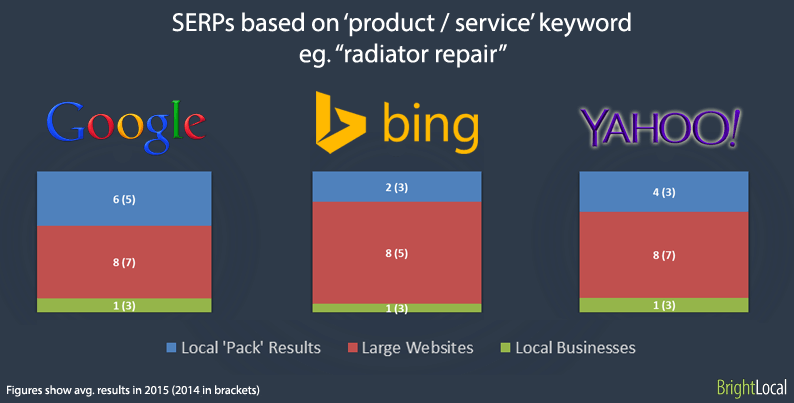Local Businesses Squeezed Out Of Organic Search By Larger Websites
Columnist Myles Anderson shares the results of a recent BrightLocal study measuring how much page-one real estate the three major search engines are giving to local businesses for various types of search queries.

A search engine study completed in early July by BrightLocal (my employer) found that local businesses are being squeezed out of organic results for high volume “head” terms, but they get greater share of voice for long-tail and geo-modified terms.
In this research, we explored which of the three main search engines are most generous to local businesses and give them the greatest amount of page one “real estate.” The objective is to provide a clear picture of whether it is local pack results or organic results that offer the best opportunity for local businesses to gain visibility in search.
This study is a follow-up piece to our 2014 study, and the full results are featured here on the BrightLocal blog.
Quick Background To Methodology
We conducted more than 500 searches across Google, Yahoo and Bing for three different types of keywords:
- Generic – e.g., plumber, dentist, attorney
- Service – e.g., radiator repair, teeth whitening, divorce lawyer
- Long tail – e.g., emergency 24hr plumber, private cosmetic dentist, top DUI attorney
We then recorded the different results returned, categorized into three types:
- Local pack results (“Pack”)
- Large websites results (“Organic”)
- Local business website results (“Organic”)
Geo-Modified vs. Non-Geo-Modified Terms
We also varied the search terms by adding a geo-modifier to 50% of the searches, allowing us to analyze the differences with and without a location included.
Local Businesses Squeezed Out Of Organic Results For Generic Terms
Generic keywords are the “money terms” that generate the largest search volume and are typically the top level keywords associated with a local business (e.g., “plumber,” “dentist,” “florist,” “attorney,” etc.).
Although highly sought-after, these aspirational terms are almost entirely out of reach for local businesses; all three major search engines give the lion’s share of organic placements to larger websites.
We classified “large websites” as non-local business sites such as news/publisher sites, national businesses, directories, and government/local authority sites. Examples of large websites include Wikipedia, Yelp, YouTube, TripAdvisor and NYTimes.
These large websites dominate the first page of organic results for generic terms, leaving very little organic ranking opportunity for small businesses. Google shows an average of just two local business websites, while displaying eight results for large websites — four times the real estate is given over to larger sites.
However, while organic opportunities may not be that accessible, local businesses are well represented in local “pack” results. Google is the most generous to local business, displaying an average pack size of six results versus just three to four displayed by Bing and Yahoo. (More analysis on Pack results below.)
Product/Service Terms Show A Similar Pattern
It is a similar story when looking at product/service keywords, such as “radiator repair,” “teeth whitening” or “haircut.”
These kinds of search terms have a mixed intent, as the searcher could be seeking information on how to tackle a task themselves or find a professional to do it for them. Thus, it’s not clear to search engines what the user wants, and the result is that local businesses are further squeezed out of the organic listings.
For product/service terms in organic results, Google, Bing and Yahoo only show an average of one local business website on their entire first page! This dropped from three placements when we last conducted this test in 2014, while larger websites have gained share of voice.
So again, we can see that it is the pack results that offer local businesses the best opportunity for local businesses to appear on page one.
Long Tail Offers Local Businesses A Way To Rank In Organic
The good news for local businesses is that long tail terms offer a much-needed ray of light in terms of greater visibility in organic results.
With long tail keywords (e.g., “top DUI attorney,” “wedding hair stylist,” etc.) local businesses get ~50% of first page space in Google, Bing and Yahoo.
This is where the real opportunity lies for SMBs — and if local businesses have ambitions to rank in organic search, then long-tail terms offer the best and most realistic opportunity.
Long tail terms are considered higher converting terms, as searchers are more specific in their needs and more advanced in the purchase path. However, the search volumes for long tail terms are significantly less than generic and service terms, so you need to rank for a high number of them to earn significant site traffic.
What About Local Pack Results?
Despite the fact that Google, Yahoo and Bing don’t offer much organic space to local business websites, local search and “pack” placements still offer the best way for SMBs to gain exposure in all three search engines.
Google is the most generous with its local search results, generally showing a six pack of results for generic or service-based terms.
Yahoo rarely alters the size of its local pack, consistently showing four results on average; Bing is the least generous search engine towards local businesses, returning just one to three local pack results for the same terms.
We know that Google has invested more heavily in developing its local offering, and the result is a better product with a greater volume of listings and richer information. Because of this, Google is more confident in its local offering and more willing to return a greater set of results for any given search.
Geo-Modified Terms Are More Local- Friendly
For 50% of the searches, we added a geo-modifier to the search terms. The change in the mix of results returned was significant.
Once a geo-modifier is applied to any type of search term — e.g., “plumber phoenix, az” — all three search engines are a lot more local-friendly, with a greater share of page one space going to local businesses.

With geo-modified keywords, local business websites are better represented across the board.
The quantity of pack results increases, as does the quantity of local business websites in organic results (at the loss of large websites).
It’s clear that Google, Bing and Yahoo all use the inclusion of an explicit location as a determinant of local intent, resulting in more local results being served up to searchers.
Restaurants & Bars Get Less Love In Local
After looking at more functional business types (e.g., plumbers, attorneys, builders), we turned our attention to entertainment and leisure-focused businesses — e.g., “restaurant,” “cafe,” “bar,” “pub.” We know that these businesses are treated differently by search engines and that different result display types are used.
With just a generic leisure term entered (e.g., restaurant), Google shows a reduced pack with just three local results (the “snack pack“), which is less than both Bing and Yahoo (who both show a five pack of local results).
However, Google is the “champion” of local restaurants and bars, giving them much more space in organic results than other engines.

Bing and Yahoo almost entirely neglect local business websites in organic results.
From this, we can assume that while Google requires searchers to use a geo-modifier for generic keyword searches (such as plumbers, accountants, attorneys), it is far quicker to assume local intent in searches for restaurants, bars and cafes.
Local Businesses Should Focus On Content & Local Optimization
The conclusions that we draw from this study are:
- The local pack offers the most consistent opportunity for local businesses to appear on page one, so local businesses should focus efforts on local search optimization.
- Long tail terms offer the best organic ranking opportunity, so local businesses need a solid content strategy that delivers unique and deep content covering a wide range of relevant topics.
Contributing authors are invited to create content for Search Engine Land and are chosen for their expertise and contribution to the search community. Our contributors work under the oversight of the editorial staff and contributions are checked for quality and relevance to our readers. The opinions they express are their own.
Related stories
New on Search Engine Land


